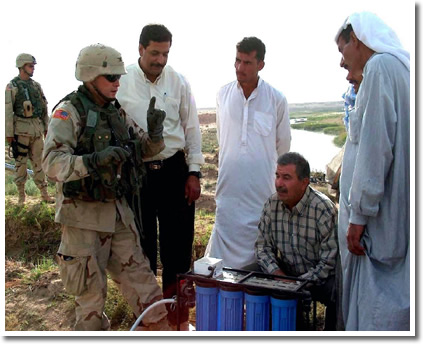Challanges
in the Battlefield | Overview of LS3
Systems | Mobile Field Units |
Military Desal Units | Logistics
and Readiness | Military Product Reference
| Military Catalog
 Military
Challenges in the Battlefield Military
Challenges in the Battlefield
Extended lines of communications and logistic requirements are
the challenge of the modern battlefield.
Fuel and water account for the majority of transportation requirements
in combat, if we can eliminate one of these requirements by having
the organic capability to produce clean water those transportation
assets can then concentrate on other needs
In today' s military the necessity for units to be self sufficient
is of the utmost importance. Currently all water purification assets
come from outside the Brigade and are pushed down as required; leaving
the Brigades, Battalions, and Company' s to be totally dependant
upon logistical allocations from their upper echelons headquarters.
 The
Organization The
Organization
- Must Be An Independent, Deployable Organization
- Able To Fight
- Able To Sustain Itself
- And Able To Win In Any Environment
The Brigade Combat Team
- A Brigade Combat Team (BCT) - 2500 to 4500 Soldiers
- Water Requirements 20K to 60K per day
- A BCT Relies on Corps Level Assets for Water Purification
- The BCT Pushes Bulk Water, Fuel and Other Supplies Forward
Through Use of the Forward Support Battalion
- No Organic Means to Purify Water
It is proposed that each Brigade has at least three Global LS3
DESAL-M1200GPH systems or a series of Global' s new AAR containerized
Global LS3 DESAL-M600GPH or M300GPH series systems These units can
be trailer mounted or fit onto the flatbed of a 5-ton. They require
from from 40Kw to 150Kw generators to operate and can be situated
with the Brigade Support to supply all the water needs for the Brigade
encampment.
A Battalion Task Force
- A Battalion Task Force - 500 to 800 Soldiers
- Water Requirements 5K to 8K per day
- A Task Forces Relies on Bulk Water Being Pushed Down From the
Brigade Combat Team (BCT) in 5000 Gal Tankers to Refill Bladders
and Water Buffaloes
- The Task Force Pushes Bulk Water, Fuel and Other Supplies Forward
Through Use of the Support Platoons or Forward Support Companies
via LogPac Convoys
- No Organic Means to Purify Water
It is proposed that each Battalion has At least 3 Global LS3 DESAL-M300-GPH.
These units are conatinerized and ready for trailer mounting. They
require a 20Kw generator to operate and can be situated with the
Battalion Support to supply all the water needs for the Battalion'
s encampment. This will also eliminate the need for external vehicles
to haul water and Water Buffaloes and move more critical ammunition
and food forward. As the unit will be able to fill their water buffaloes
with purified water from the LS3.
A Company/Team
- A Company/Team - 60 to 150 Soldiers
- Water Requirements 1K to 2K per day
- A Company/Team Relies on Bulk Water Being Pushed Down From
the Task Force with the Daily LogPac and uses 500 Gal Water Buffaloes
to Store Water - Sometimes Bladders are Pushed Forward
- No Organic Means to Purify Water
It is proposed that each Company has at least four Global LS3-8000
series systems to be issued to combat platoons as required. These
units are mounted in carrying cases and operate off of either AC
120/240 or 24V battery with Solar Array, they will fit into a single
vehicle and be operated on an as needed basis to supply all the
water needs for the Company and Platoons. Because some Company'
s are situated away from Battalion and operate on their own it is
necessary that the company level have more smaller units for each
platoon including Global' s LS3-MSP-2 Back Pack series. These units
will produce about a gallon of water per minute and are able to
operate under silent operations if necessary.
Special Ops and LRRP' s
It is these soldiers that have to be self sufficient as the time
they are in the field and the job they must accomplish dictate being
self sufficient. Each team should have with them at least one of
the LS3-MSP-2 Back Pack series. These units will produce about a
gallon of water per minute and are able to operate under silent
operations if necessary.
|




